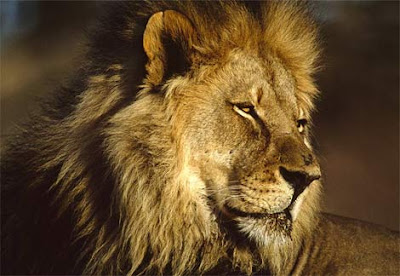 African Lion Photo
African Lion Photo African Lions
African Lions Pictures-of-African-Lion
Pictures-of-African-Lion African Lions Photo
African Lions Photo
 African Lions Picture
African Lions Picture
African Lions Info :
Lions are unique in that they are the only cats to live in groups (prides). They are the largest member of the cat family and the largest of all the African carnivores. They are are the top predator in any African ecosystem where they live.
African Lions Description and Characteristics:
Lions are Tawny in colour, varying from silvery yellow to reddish brown with paler undersides (female belly yellowish to almost white); yellow to black mane. Faint, leopard like spots are generally found on the young which is sometimeskept into maturity.
Males have thick mane around the head that extend down the chest between the forelegs and varies in colour from blond to black, whereas females do not have manes
Lions have massive shoulders and strong forelimbs, long, sharp claws, and short, powerful jaws. A Lions' roar can be heard by humans more than 8 km away.
Prides of lions are generally composed of related females, whilst a typical prides contains around 13 lions, large prides can contain as many as 40 lions, while some prides will have a few as two members. A prides home range varies in size from 20-400 km².
Lions are mainly nocturnal and are reputed to sleep or rest for about 20 hours a day. You will often find them lying under a shady bush, particularly after they've fed following a kill.
African Lions Feeding/drinking Habits:
As carnivores, feeding entirely on the flesh of other mammals, lions have 30 teeth, including large piercing canines to grab and kill prey, scissorlike molars to slice into flesh, and small incisors to scrape meat from bones. Much of their hunting is done at night and in the very early dawn. When feeding on a large kill, a lion can eat almost 36 kg of meat in one feeding and then not need to eat for several days. On average, a lion needs to eat about 5 kg of meat daily.
African Lion Habitat:
The lion is found throughout the south Sahara desert and in parts of southern and eastern Africa. They are generally seen on grassy plains, savannas, and dry woodlands but never seen in heavily forested areas. The lion can be found in most of the National Parks and Reserves in Africa.
African Lion Size & Lifespan
Males reach up to a shoulder height of 1.2meters and weight between 150-250kgs, females are smaller and reach a shoulder height of 1.05m and weigh up between 120 -180 kgs. Lions live for 12-16 years in the wild and 25 years in captivity.
African Lions Reproduction:
A lioness has a gestation period of about 110 days, after which she can gives birth to up to four cubs. Generally she gives birth in a secluded areas away from the group and introduces the cubs to the pride when they are about eight weeks old. Very often, several females give birth at about the same time, and they share the duties of protecting and nursing the cubs. Mothers nurse for up to 8 months, although they begin to take cubs to eat at animal kills when they are as young as 3 months old. At about 11 months of age, cubs start learning to hunt with the pride. Females take care of their young until they are about two, when the mother is ready to produce a new litter.
Predators and Threats:
Although the population of lions is declining, they are not currently listed as endangered or threatened. Threats include hunting, loss of habitat and human encroachment.
Source : http://animalszooguru.blogspot.com